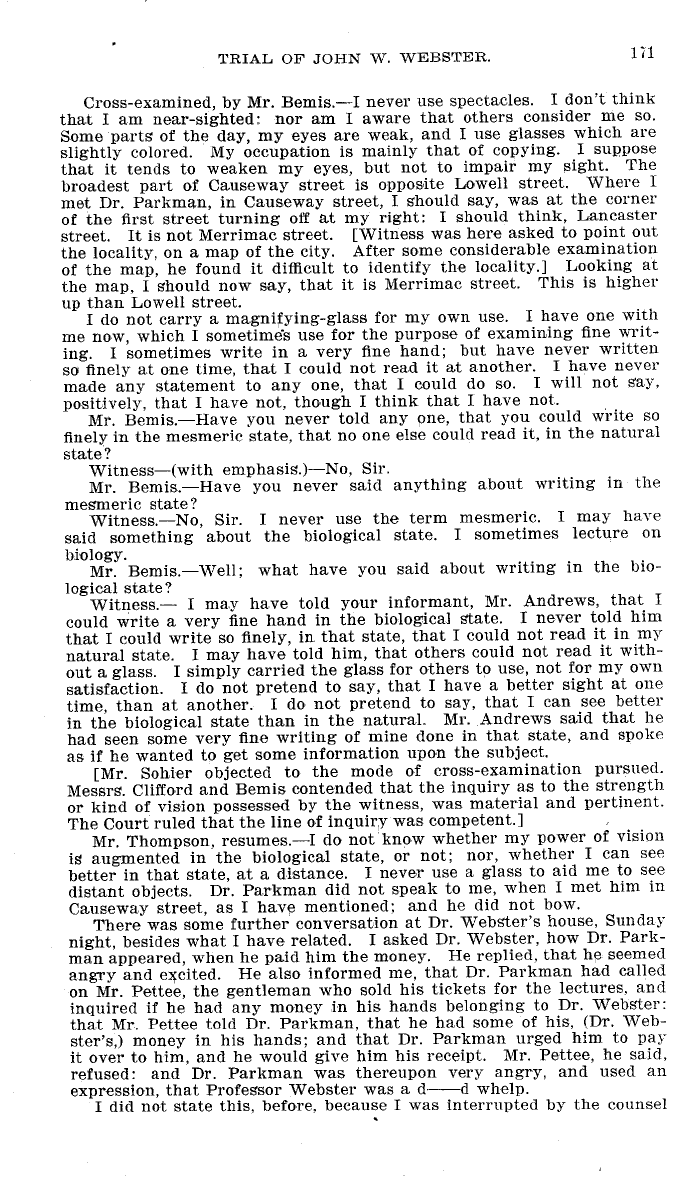|
TRIAL OF JOHN W. WEBSTER. 1 il
Cross-examined, by Mr. Bemis.-I never use spectacles. I don't think
that I am near-sighted' nor am I aware that others consider me so.
Some parts of the day, my eyes are weak, and I use glasses which are
slightly colored. My occupation is mainly that of copying. I suppose
that it tends to weaken my eyes, but not to impair my sight. The
broadest part of Causeway street is opposite Lowell street. Where I
met Dr. Parkman, in Causeway street, I should say, was at the corner
of the first street turning off at my right: I should think, Lancaster
street. It is not Merrimac street. [Witness was here asked to point out
the locality, on a map of the city. After some considerable examination
of the map, he found it difficult to identify the locality.] Looking at
the map, I should now say, that it is Merrimac street. This is higher
up than Lowell street.
I do not carry a magnifying-glass for my own use. I have one with
rue now, which I sometimes use for the purpose of examining fine writ-
ing. I sometimes write in a very fine hand; but have never written
so finely at one time, that I could not read it at another. I have never
made any statement to any one, that I could do so. I will not say,
positively, that I have not, though I think that I have not.
Mr. Bemis.-Have you never told any one, that you could write so
finely in the mesmeric state, that no one else could read it, in the natural
state?
Witness-(with emphasis.)-No, Sir.
Mr. Bemis.-Have you never said anything about writing in the
mesmeric state?
Witness.-No, Sir. I never use the term mesmeric. I may have
said something about the biological state. I sometimes lecture on
biology.
Mr. Bemis.-Well; what have you said about writing in the bio-
logical state?
Witness.- I may have told your informant, Mr. Andrews, that I
could write a very fine hand in the biological state. I never told him
that I could write so finely, in that state, that I could not read it in my
natural state. I may have told him, that others could not read it with-
out a glass. I simply carried the glass for others to use, not for my own
satisfaction. I do not pretend to say, that I have a better sight at one
time, than at another. I do not pretend to say, that I can see better
in the biological state than in the natural. Mr. Andrews said that he
had seen some very fine writing of mine done in that state, and spoke
as if he wanted to get some information upon the subject.
[Mr. Sohier objected to the mode of cross-examination pursued.
Messrs. Clifford and Bemis contended that the inquiry as to the strength
or kind of vision possessed by the witness, was material and pertinent.
The Court ruled that the line of inquiry was competent.]
Mr. Thompson, resumes.-I do not know whether my power of vision
is augmented in the biological state, or not; nor, whether I can see
better in that state, at a distance. I never use a glass to aid me to see
distant objects. Dr. Parkman did not speak to me, when I met him in
Causeway street, as I have mentioned; and he did not bow.
There was some further conversation at Dr. Webster's house, Sunday
night, besides what I have related. I asked Dr. Webster, how Dr. Park-
man appeared, when he paid him the money. He replied that he seemed
angry and excited. He also informed me, that Dr. Parkman had called
on Mr. Pettee, the gentleman who sold his tickets for the lectures, and
inquired if he had any money in his hands belonging to Dr. Webster:
that Mr. Pettee told Dr. Parkman, that he had some of his, (Dr. Web-
ster's,) money in his hands; and that Dr. Parkman urged him to pay
it over to him, and he would give him his receipt. Mr. Pettee, he said,
refused: and Dr. Parkman was thereupon very angry, and used an
expression, that Professor Webster was a d-d whelp.
I did not state this, before, because I was interrupted by the counsel
|

